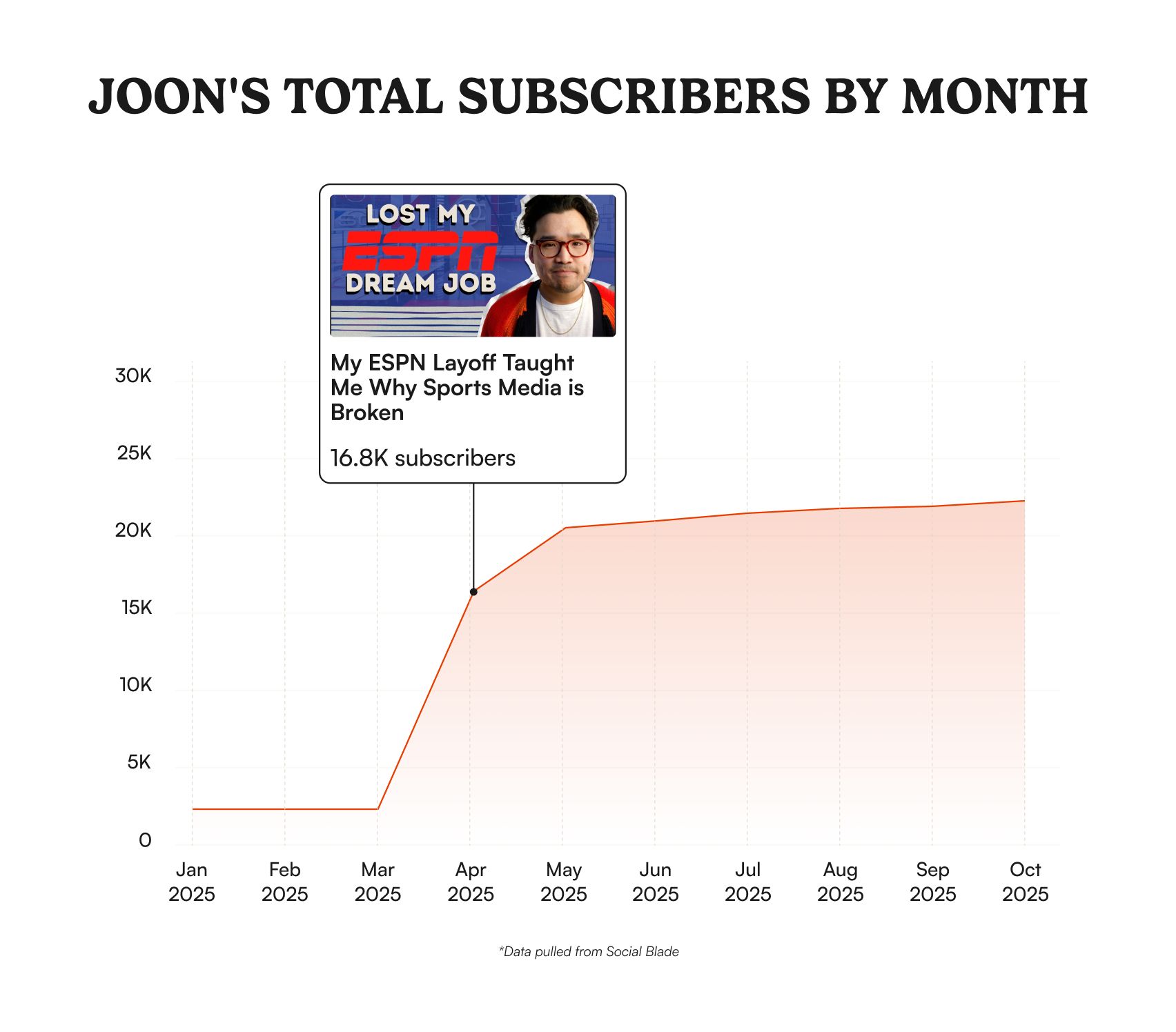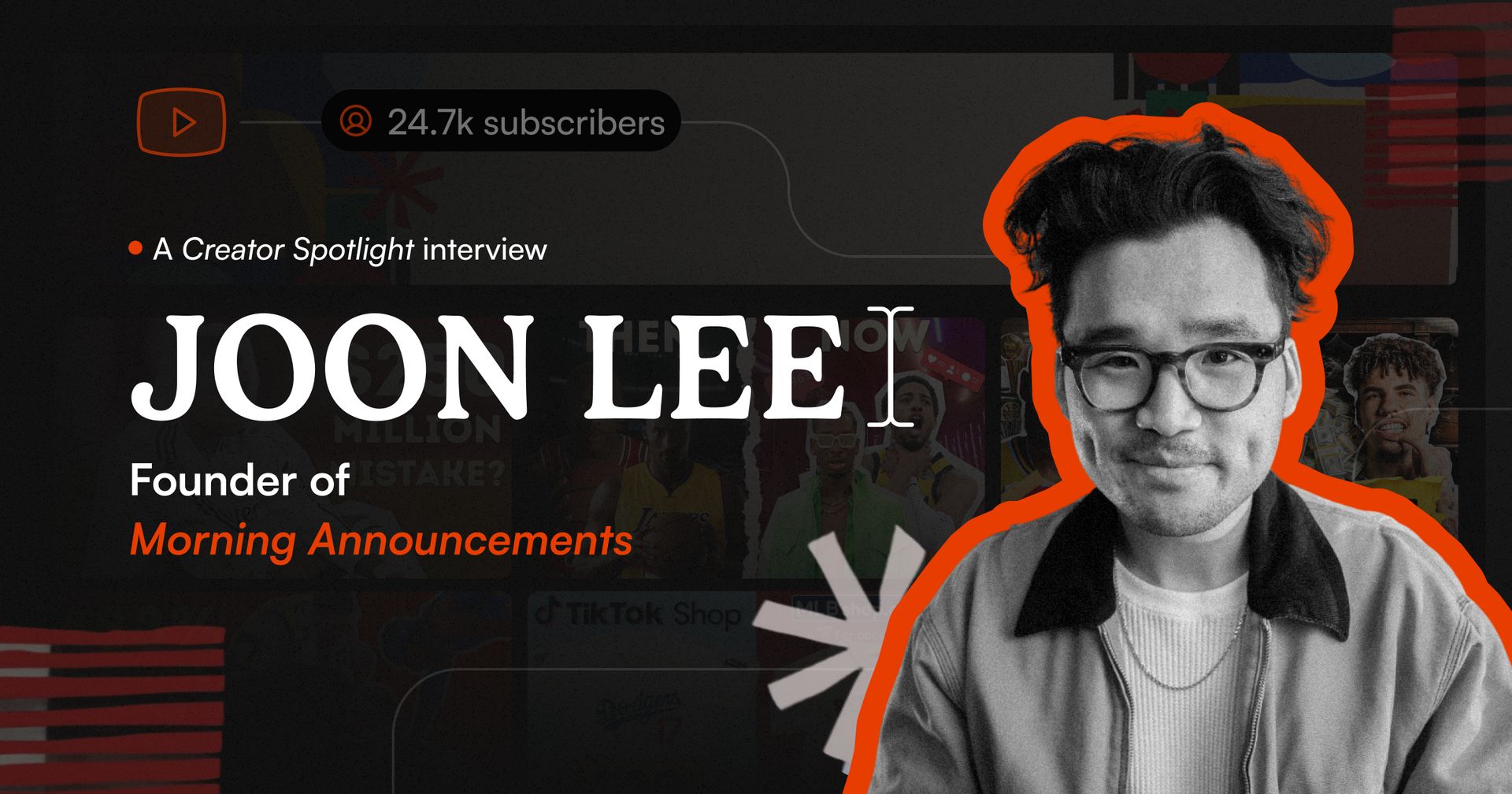When ESPN laid him off, Joon Lee still had 22 months left on his contract. They paid him not to work; if he did work, he’d have to forfeit what they owed him.
He used the time to study YouTube, master After Effects, and design a blueprint for an independent sports journalism business. Five months after launching his channel, he’s earning through AdSense and freelance work while turning down the gambling sponsors who now fund much of sports media.
In this episode:
✍ Planning and launching an indie media venture
⚖️ Balancing platform rules with journalistic rigor
💰 Building audience trust by saying no to certain sponsors
— Natalia Pérez-González, Assistant Editor

00:00 Introducing Joon Lee
01:15 From tech YouTuber to sports journalist
06:49 Preparing to be a YouTuber
13:02 Indie creator bootcamp
17:05 What should new creators focus on?
22:58 The process of making high-quality YouTube videos
33:19 Making revenue and maintaining ethics
40:56 The most valuable asset as a creator is trust
44:55 Building relationships in the creator economy
50:30 The hardest part of YouTube
🎧 If you prefer a podcast platform other than YouTube, we’re on Apple, Spotify, and all the rest.
Stop renting your audience from YouTube
You’re building an audience. So why should you give it all away when it comes to video content?
With Open.Video, you keep every subscriber to your channel. That means you can email them directly, export the list, and use it anywhere you want — just like your newsletter. No middlemen. No hoping for algorithm mercy. It’s all yours.
Open.Video works exactly like YouTube, and you can even link it so it’s seamlessly dropped in as a replacement. You control the branding, layout, and placement (even on your own domain), so you’re finally free to build your channel your way.
This is an advertisement.

Turning a non-compete into competitive advantage
For 22 months, Joon Lee was paid not to work. ESPN had laid him off, but he was still on contract; they had to keep him on payroll. A non-compete clause meant they had to approve any new opportunity or he’d risk breaking the contract and losing his income.
They gave him veto after veto. No freelance writing. No escape hatch to another job. He wasn’t even allowed to make sports content for his own YouTube channel.
So he trained.
Joon turned his apartment into YouTube University. Colin & Samir videos taught him packaging strategy. Former Vox journalists Cleo Abram and Johnny Harris showed him how to build massive, independent channels.
He was 27, had no children, and was unmarried. How many times does someone get two years of paid time to prepare for their next career? Joon saw it as a rare opportunity and capitalized on it.
He spent late nights learning After Effects, sketching out his visual language, "a nostalgic scrapbook that evokes childhood fandom." He flew to Europe multiple times to watch soccer and immerse himself in the culture.

The launch:
When his contract finally expired in early 2025, Joon had prepared his launching pad. Viewers (108,875 of them, at time of writing) rallied around his YouTube debut, “My ESPN Layoff Taught Me Why Sports Media Is Broken.” He gained more than 12K subscribers that same month, on the back of his announcement video.

The announcement earned Joon press across creator economy and sports outlets. Since that initial push, none of his nine videos have generated new subscribers at the scale of the first; growth has continued, just slower. He’s had to rely more on the YouTube algorithm for growth.
Where did the 4,500 subscribers Joon had before his announcement come from? He was a teenage tech YouTuber, with over 130 videos reviewing headphones, iPhone cases, and the like still on his channel.
His greatest hit:
His most popular video — explaining why many knockoff jerseys are now of a higher quality than the “authentic” products — has 556,000 views at the time of writing, nearly 20 times his total average of 29,000 views (since rebooting his channel).
This video resonated because it answered a specific, relatable frustration: Why does my $150 jersey fall apart in the wash? Lee brought an old jersey and a new Fanatics-produced jersey to vintage sports apparel experts in New York, had them break down the quality differences, then explained the business reasons behind Fanatics' monopoly and cost-cutting. Rigorous reporting packaged around a question his audience was already asking, in a relatable, point-of-view format.
How Joon makes money:
Five months into launching Morning Announcements, his production company, Joon is funding the operation through YouTube AdSense, freelance writing for the New York Times and Boston Globe, and a book deal in progress about how fandom has changed. He's not relying on the YouTube channel to support himself, but he has a specific vision for where the business needs to go.
Sponsorships will be the bulk of it, but only after he's built enough trust to make them valuable. That's the bet: turn down money now for the right money later.
His ideal future revenue mix:
65% from brand sponsorships
25-30% from AdSense
5% from freelance work
He has no full-time employees yet, just a couple of contractors — an animator and a video editor — but he knows the sponsorships will only come after he’s built enough trust to make those partnerships valuable.
"If I'm able to build that trust and credibility now, when it's both at a premium and doesn't exist in the way it used to in sports, that's what's going to keep the channel afloat for the long term."

Connect with Joon Lee on LinkedIn.
Learn more about him here.
Subscribe to his YouTube channel.
Contribute to our monetization trend report
Whether you're earning $100 or $100,000 as a creator this year, whether you're working solo or building a team, whether you're thriving or struggling, we’d love to hear from you.
It’ll take you 3–5 minutes to fill this out our survey. We’ll publish the results in December, right here in the newsletter.

Trust is the currency — protect it, monetize it
Sports gambling sponsors have contacted Joon with offers, and he keeps turning them down. Not because he's opposed to sponsorships as a revenue stream, but because it pays to be precious about editorial purity.
He's saying no because he understands trust is harder to build than reach, and once you spend it, you can't get it back. Audience trust is a product of creator principles in practice.
"What advertisers are ultimately looking for in the long term with these brand deals and the creators that they partner with is someone who has trust and credibility with their audience. In order to have as much trust and credibility as you can with your audience, you need to say the truth."
The truth Joon is referencing is that sports gambling has disrupted sports media. DraftKings, FanDuel, ESPN Bet — they're funding shows, podcasts, segments across the industry. Joon recently wrote two New York Times op-eds about how that money has degraded the fan experience and the leagues’ integrity. Taking it now would undercut everything he's building.
This is the central tension in the creator economy: you need money to sustain your work, but the wrong money can destroy the asset you're trying to monetize. The most valuable asset in the creator economy is audience trust.
Audiences are more skeptical than ever, but they're also more willing to trust individual creators than institutions; people trust people. This creates an enormous opportunity for creators who can build credibility and a barrier for those who spend it carelessly.
Building trust requires saying no. Identify the money that would compromise your core values. For Joon, it's sports gambling, because his entire pitch is truth-telling about sports media. For a fitness creator, it might be supplements with questionable ingredients. For a finance creator, it might be crypto projects or get-rich-quick schemes.
The test: If you took this sponsorship, would your audience question whether you actually believe what you're saying? If yes, it's the wrong money.Make your refusals visible when strategic. Joon's Times op-ed about sports gambling was a public stake in the ground. His audience knows where he stands. When he does eventually take sponsors, they'll trust his decisions because they've seen what he rejected.
Be honest about the privilege required. Joon is transparent that he had ESPN severance. He has a strong résumé that opens freelance doors. He's engaged but doesn't have kids. Not everyone can turn down revenue while they build.
But even if you need to take imperfect deals now, you can still be strategic about which ones you take and what you're building toward. Take the money you need, but have a plan for when you can afford to be more selective.






